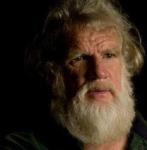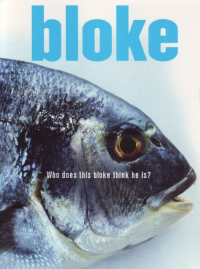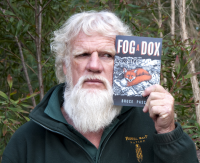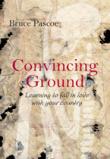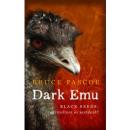AustLit
-
In the seventh of this series of interviews, Anita speaks to Bruce Pascoe.
Bruce Pascoe is a prolific writer of fiction, young adult fiction and non-fiction. He was a long-time editor and publisher of Australian Short Stories (1982-1998). His YA novel Fog A Dox won the prestigious 2013 Prime Minister's Literary Award for young adult fiction. He lives in Victoria.
-
I was shocked to read The Tree of Man [by Patrick White] and to see an Australia I knew. The whole of William Faulkner’s list, he’s a genius. Faulkner creates worlds where you can look back into several generations and you see history happening, not the history of kings and queens but the history of ordinary, flawed people. And he was never afraid to show black people with real personalities and real lives. Oodgeroo. Uncle Jack Davis. When I grew up, there were no Aboriginal novelists.
-
-
Most of Faulkner’s.
-
Carpentaria by Alexis Wright, Archie Weller’s stories, Am I Black Enough for You? by Anita Heiss, Ruby Moonlight by Ali Cobby Eckermann, Every Secret Thing by Marie Munkara, Judith Wright’s stories [poems], Labourers in the Vineyard by Colin Thiele, Benang: From the Heart and That Deadman Dance by Kim Scott. And mine.
-
No, I just read and wrote. I really don’t believe in writing classes. After teaching a thousand I could identify who could write and who couldn’t and they were better off leaving class and grabbing a pen. You can learn tricks but you can’t learn the timing and restraint of real storytelling. Read as much as you can.
-
Well, I’ve always had this compulsion to record people’s honest courage. It gets to me. People tell me a yarn or I’ll see something happen and I can see the backstory and want everyone to see that little glimpse into other ordinary, but profound lives. Our own people are full of story, full of pain and full of hope. Any Black person says they don’t know what to write about … send them to me.
And I do love the craft of writing, the construction, the modulation, seeing the world start to come alive, seeing a character come off the page and into the world and the memory of readers. People often ask me what happened to Jim Fox, or Eartha or Alf and I love the fact that we then share those stories … almost like they were alive. Which is why you should aim to write complex characters.
-
What’s your aim as a writer?
I’ve got to get these stories out of my head and I want people to consider the humanity of the ordinary and not be fixated on the banality of Sandilands (is that the name of the talent host guy?) or any of those fashionable, witless people; celebrities. I want our people to read about themselves and be proud. With non-fiction, I want Australians to stop deluding themselves about our history, and I want our own people to learn that history and be proud and strong.
-
Faulkner obviously but also my father and uncles and aunts who were brilliant in their ability to craft their oral stories with humour, timing, pathos, riveting yarns and a love of people … and the ridiculous. No-one has ever gone close, as a storyteller, to my father and Aunty Faith.
-
What’s your writing process?
Get up, go into room and work arse off. Break for lunch, tour of vegetable garden, back into room. In good weather I write down by the river, especially if it’s a job I’m writing longhand. In my room I’ve got a growing gallery of dead Black friends to watch over me and all the birds who come to the door and want to know if it’s ok if they tell me a story. The Willy Wagtail is good but the Scrubwren is profound, the Powerful Owl haunting, the pelican a bit superior on occasions and the cormorants are always good for a laugh. I get a hell of a lot of story from birds and animals.
-
I think I’m a natural storyteller. It was never my intention to write non-fiction but I had to because ‘a white man would never do it’ (to quote Kevin Gilbert). I’m writing films now, too, with the enormous support of some brilliant Sydney women. Talk about sacrifice. They stop their own work to help others … no greater love than to work for your people. Hope people notice what they do.
-
Frank Hardy said to always stop each day at a point where you know exactly what comes next so that next morning you can sit down and start straight away. Mum said work hard or the welfare will get you … nah gamin’.
-
Have no regard for money. Learn to support yourself so you can write. Don’t expect someone else to pay for your habit, you’re doing it for love, aren’t you? Have a really high tolerance to disappointment because getting published once is difficult, twice is bloody hard and more than that and strips of skin will be hanging off you. Be brave, patient and humble without losing pride in your own ability.
-
What are you working on right now?
I’m doing the penultimate edit of 'Dark Emu', a book that tells about Aboriginal agriculture and economy and an attempt to get rid of this pervasive hunter/gatherer stuff which is just another way to explain why we had to have our land taken off us. I’m writing a film for the ABC, 'Boat', a play called 'Nets', and two novels about why men make war … and insist on enjoying it. Those two books work toward a southern culture where land war is unknown and everyone is fed and the world loved as you would love a mother. Oh, and a tiny little kid’s book about Waang the crow. Apart from that, nothing.
You might be interested in...


